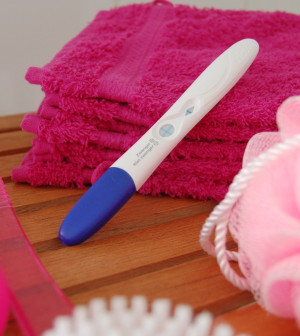- Brain Decline, Dementia Common Among Older American Indians
- Stroke, Migraine, Alzheimer’s: Climate Change Will Likely Make Them Worse
- Immunotherapy Before and After Surgery Boosts Lung Cancer Survival
- Cream Cheese From Aldi, Hy-Vee Stores Recalled Due to Salmonella Risk
- Seeing Your Doctors Via Zoom? What’s Behind Them Matters
- Mediterranean Diet Could Be a Stress-Buster, Study Finds
- PTSD Triples Odds for Teeth Grinding, Study Finds
- Dreams Might Help You Process Bad Experiences
- Lymphoma: Know Your Treatment Options
- FDA Approves First Self-Test Collection Kit for HPV
Secondhand Smoke Linked to Miscarriage Risk


THURSDAY, Feb. 27, 2014 (HealthDay News) — Breathing in someone else’s tobacco fumes might raise a woman’s odds for miscarriage, stillbirth or other complications, a new study suggests.
The study found that the risk to pregnancy rises the longer women are exposed to secondhand smoke.
Researchers led by Andrew Hyland of the Roswell Park Cancer Institute in Buffalo, N.Y., tracked data on more than 80,000 postmenopausal women who’d taken part in the landmark Women’s Health Initiative study.
All of the women had been pregnant at least once. Of these women, 6.3 percent were smokers, 43 percent were former smokers, and about 51 percent were nonsmokers. Hyland’s team assessed how much secondhand smoke the nonsmoking women had been exposed to as children and adults, both at home and at work.
Nearly one in three of the participants had experienced at least one miscarriage. Out of all the women, 4.4 percent experienced a stillbirth and 2.5 percent had undergone a tubal ectopic pregnancy, where the fertilized egg attaches outside the uterus.
Compared to women who had never smoked, women who used to smoke during their reproductive years were 16 percent more likely to have had a miscarriage, 44 percent more likely to have had a stillborn child and 43 percent more likely to have experienced an ectopic pregnancy.
The study’s authors noted there was also a link between secondhand smoke exposure and complications of pregnancy among women who never smoked. The longer the nonsmoking women were exposed to the smoke, the greater their risk.
The team also focused on women with the greatest level of lifetime exposure to secondhand smoke. These included women who spent more than 10 years exposed to fumes as a child, more than 10 years as an adult working in a smoke-filled workplace, or more than 20 years as an adult exposed to secondhand smoke in the home.
These women were 17 percent more likely to have a miscarriage, 55 percent more likely to experience a stillbirth and 61 percent more likely to have an ectopic pregnancy, compared to women without these exposures, the study found.
Younger and more educated women, the study also showed, were less likely to experience these complications of pregnancy than black women and those of other minority ethnicities, as well as women who were overweight.
While the study was able to show an association between secondhand smoke and pregnancy complications, it wasn’t designed to prove cause and effect.
The findings were published online Feb. 26 in the journal Tobacco Control.
More information
The U.S. Centers for Disease Control and Prevention provides more information on the health effects of secondhand smoke.
Source: HealthDay
Copyright © 2024 HealthDay. All rights reserved.










